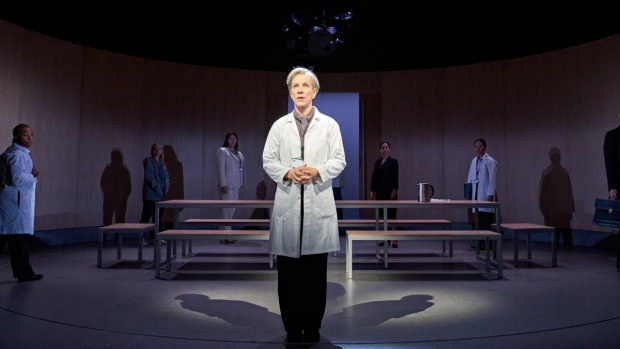”The Doctor” at the Duke of York’s Theatre – review

© Manuel Harlan
A 14 year-old has died at the start of The Doctor. The crucifix-sporting teen was brought into a medical institute, run by one Ruth Wolff (the titular doctor), after a botched self-administered abortion. In the closing moments of her life, Wolff denies a priest access to the Catholic youngster’s bedside: the clinician argues that the presence of clergy will only distress the patient and worsen the circumstances of her passing.
A heady 15 minutes kicks off Robert Icke’s piece, finally opening in the West End. In Icke’s vision, Arthur Schnitzler’s Professor Bernhardi – which acts as the inspiration for the three-hour play – is radically transformed: Wolff’s actions are a theoretical touch paper – with a conflagration of concepts and charged conversations following.
Together with Anthony Almeida (who directs the West End staging –the show was first presented in north London in 2019), Icke has his characters prowl a slow revolve, as the issue of the teenager’s death picks up a whirling hysteria – battle lines are drawn, statement are drafted. Wolff’s Jewish identity is dissected, as if she has been placed on a public petri-dish, while the integrity of her institute is called into question.
But, as anyone who has seen his work before won’t be surprised to know, Icke adds an extra twist of stagecraft – in this case casting with deliberately indecipherable identities. Genders and racial characteristics of all on stage are deliberately ambiguous at the beginning (some remain so through to the end of the show). It adds a sense of inertia, forcing the audience to jettison their assumptions about those they see in front of them. Sometimes Wolff is a woman in a room packed full of shouting men, and it is only later that we come to understand what that might mean.
So on one level there is medical ethics, on another there is identity, while a final piece of the puzzle is a whole debate concerning the use of language. For the medical world, words are precise, definite. In our increasingly hazy world, meaning and origin meld with contemporary usage. Wolff, an ardent grammarian, is blind-sided in act two when her presuppositions are swept aside.
Kudos to Icke, Almeida and drummer Hannah Ledwidge for making the experience feel more like a thriller than academic stodge. Designer Hildegard Bechtler has a long, single table sit in the centre of the stage – a solid nod to a biblical image if you needed one – the battleground for ideologies, religions, racial tensions, abortion issues and generational conflict.
The cast are on fine form – Juliet Stevenson as Wolff proves once more why she is one of the finest performers of a generation, aided by a stellar supporting team.
But in this fast-paced, digitally-driven world, the force of Icke’s work has been dampened by the shifting tides of global events. It’s hard to shake the feeling that the show would have provided a jackhammer of oomph had it arrived in the West End in 2020 – but already displays some of its age. A whole section about the etymology of the word “woke” has become passé (now that the term has been reappropriated in a derogatory sense by certain aspects of the media) while the whole concept of medical ethics has been no stranger to the headlines over the last few years, for obvious reasons.
Just like its protagonist, then, you could say that Icke’s work has, in a small way, been the victim of circumstance. But Juliet Stevenson’s unquenchable, indefatigable performance is transcendent. It has to be seen to be believed.













